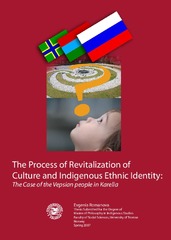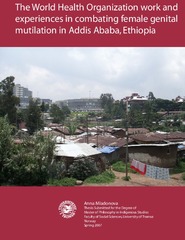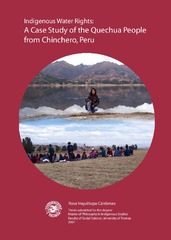Blar i utgivelsesdato Master's theses in indigenous studies
Viser treff 1-20 av 153
-
Fishing under the consent of the Kingdom : from local requests to indigenous claims in a coastal Sami fjord
(Master thesis; Mastergradsoppgave, 2005)In the thesis, we follow the development of a discourse on coastal Sami rights on the local level and in public discourses from the 1970s up until today. In Norwegian fisheries management, fishing is only to a certain extent protected from regulations that threaten culture, livelihoods and settlement in coastal Sami areas. Resource use in coastal Sami areas has previously not been a subject of ... -
Cultural mediation : a case study of Sami research
(Master thesis; Mastergradsoppgave, 2005-06-06)My work of cultural analysis is a labyrinth for cultural understanding and mediation. At work are the disciplines and trends of analysis - cultural, historical and legal-, the minotaurs. ''Cultural Mediation. A Case Study of Sami Research'' is the nest of a magpie with bits and pieces gathered in a mixed style, interdisciplinary, translating the oral tradition of the academic lectures in the ... -
The bola or parma of the Newar in Manamaiju Village. The significance of a farm labor exchange system among indigenous peasants in Nepal.
(Master thesis; Mastergradsoppgave, 2006-06-08)This thesis is devoted to a study of the reciprocal labor exchange system bola, and the indigenous knowledge that it supports. The field study took place in a rural area of Nepal where agriculture is the main occupation. I observed the system in action in Manamaiju village where Newari peasant groups, including their farmer groups Jyapu, live and which is situated in Kathmandu District. The Newar ... -
Contested land rights. Oromo peasants struggle for livelihood in Ethiopia
(Master thesis; Mastergradsoppgave, 2006-06-09)The questions of land rights, identity and power are related to what constitutes nation-states, the relations between nation state and their constituent peoples and territories. These questions are debatable in artificial African nation states emerged in the wake of European colonialism. The notions of territoriality defined in context of African nation states are more likely sources of frictions ... -
When knowledge is not power. The integration of traditional midwifery into the health system. The case study of a traditional midwife among the Toka of Zambia
(Master thesis; Mastergradsoppgave, 2006-06-16)Health is one of the major problems facing most developing countries like Zambia. Poor economies, low funding, shortage of staff, epidemics like AIDS, coupled with poor and sometimes inaccessible facilities make the provision of health difficult. The 1978 Alma Ata conference’s call for health for all seemed a far cry for such countries. But the conference was aware of this problem and thus, its ... -
The household responsibility contract system and the question of grassland protection. A case study from the Chang Tang, northwest Tibet Autonomous Region
(Master thesis; Mastergradsoppgave, 2006-06-23)The implementation of the Household Responsibility Contract System (HRCS) for grassland is ongoing in the pastoral area of Tibetan Autonomous Region (TAR). The main purposes of the HRCS are to reverse the degradation of the rangeland, promote sustainable development of grassland and to increase nomadic production to transform traditional animal husbandry into a more modern development. In this thesis ... -
"Make our children proud of the heritage". A case study of the Commission for the Promotion and Protection of the Rights of Cultural, Religious and Linguistic communities in SA with specific reference to the emerging Khoe and San indigenous peoples in the Republic of South Africa
(Master thesis; Mastergradsoppgave, 2006-06-30)The government of the Republic of South Africa established a human rights enshrined constitution. To implement it, various commissions were established to promote constitutional democracy by embracing their diverse cultures and take up the challenge of changing the racist and segregationist ideals of the recent Apartheid past to a nation unified in its diversity and embracing its’ Africanness. The ... -
Radio and indigenous peoples. The role of radio in the sustainable livelihoods of indigenous peoples: A case study of the Rakhaing and the Garo people in Bangladesh.
(Master thesis; Mastergradsoppgave, 2006-08-23)Sustainable livelihood means to live with the close harmony without losing ecosystem both in economical, social, environmental and cultural elements. Or other ways we can say live without the degradation of economical, social, environmental and cultural elements of an indigenous group is sustainable livelihood. Radio has the strong role in the sustainable livelihood of indigenous people. Mother ... -
Rural women and micro-credit schemes. Cases from the Lawra District of Ghana.
(Master thesis; Mastergradsoppgave, 2006-08-23)In an attempt to alleviate poverty and empower poor people, many NGOs and government line agencies have been providing credit and social services to rural women in the Lawra District of Ghana. The essence of these credit schemes is to help the rural poor, especially women, earn a decent living through their on-going income generating activities (IGA). The study emphasized that rural women play ... -
School on the "move". A case study: Nomadic schooling of the indigenous Evenk children in the Republic of Sakha Yakutia (Russian Far East)
(Master thesis; Mastergradsoppgave, 2006-08-29)The present state of the traditional culture of indigenous people in Russia can characterised as critical. It is well known that education was used as a main tool for acculturation and assimilation of non-Russian ethnic groups during the policy of Russification. In recent time the revitalisation of the indigenous minority culture stimulates a process of bringing back the nomadic schools. The nomadic ... -
On the future of indigenous traditions : the case of Adivasis of Jharkhand, India
(Master thesis; Mastergradsoppgave, 2006-11)This thesis, ‘On the Future of Indigenous Traditions: The Case of Adivasis of Jharkhand, India’ on the whole by making it a case study brings a focus on the Adivasis as the indigenous peoples of India. It touches upon a few important historical facts of the groups of Adivasis now located in the central-east part of country. Additionally it goes on into the sources that determine their traditional ... -
"May They Live with Herds". Transformation of Mongolian Pastoralism in Inner Mongolia of China
(Master thesis; Mastergradsoppgave, 2006-12-13)This thesis is dedicated to a better understanding of Mongolian pastoralism transformation in the contemporary Inner Mongolia context. Such a comprehension requires both the knowledge of common resource management and a historical analytical approach. A multidisciplinary approach based on institutional theory is proposed, primarily because the research rationale on reflection of fieldwork information ... -
The Impact of Economic Reforms on the Maasai Pastoralists of Tanzania: The Case of Migrant Youths
(Master thesis; Mastergradsoppgave, 2007-05)<p>Since the mid 1980s, Tanzania has adopted the structural adjustment programs 9SAPs) that are sponsored by the World bank and the International Monetary Fund to improve upon its economic performance. In Tanzania, structural adjustment programs have focused on institutional reforms known as privatisation, cutting of government expenditure in various economic and social sectors, and to boost ... -
The Faraqasa indigenous pilgrimage center. History and ritual practices.
(Master thesis; Mastergradsoppgave, 2007-05-18)The Faraqasa indigenous pilgrimage center is one of the most popular pilgrimage centers in Ethiopia. It was founded by a woman named Ayyo Momina in the first quarter of the twentieth century and it is situated at a place called Faraqasa, in Arsi zone of the Oromia region in Ethiopia. It is important to study this institution since it shades light on one of the indigenous beliefs and practices in ... -
Ethnicity and inter-ethnic relations. The ‘Ethiopian experiment’ and the case of the Guji and Gedeo
(Master thesis; Mastergradsoppgave, 2007-05-29)This study deals with ethnicity and inter-ethnic relations in African context, with particular emphasis on the new ‘Ethiopian Experiment’ of ethnic politics. The study challenges the already existing thoughts on ethnicity, which map the concept on contours of polar extremes and suggests an approach to transcend the primordialist/constructivist perspectives. It is argued that in the face of rising ... -
The process of revitalization of culture and indigenous ethnic identity. The case of the Vepsian people in Karelia
(Master thesis; Mastergradsoppgave, 2007-06-19)This thesis is mainly focused on theoretical study of ethnicity and indigenousness, with some particular attention to language and politics. Some aspects of identity building and self-awareness among the Veps people living in Karelia are in focus. The study is interdisciplinary and thus also methodologically plural though the primary approach to ethnic identity is based on idea that ethnicity is ... -
The World Health Organization work and experiences in combating female genital mutilation in Addis Ababa, Ethiopia
(Master thesis; Mastergradsoppgave, 2007-08-23)This thesis is dedicated to a better understanding of World Health Organization contribution to process of combating female genital mutilation in Addis Ababa, Ethiopia. The World Health Organization is well known all over the world for their work in public health. This organization is dealing with many issues concerning health and well being of people, the one of these issues is combating female ... -
A comparison between Japan and Norway regarding ILO Convention No. 169
(Master thesis; Mastergradsoppgave, 2007-11-08)Who defines indigenous peoples, and in whose interests does the definition serve? If there is a definition that is regulated in relation to indigenous peoples, how much does it the protect rights of indigenous peoples? Considering these questions as my point of departure, I have chosen to do a comparative study on the Sami in Norway and the Ainu in Japan in the context of ILO Convention No. 169. ... -
Indigenous water rights : a case study of the Quechua people from Chinchero, Peru.
(Master thesis; Mastergradsoppgave, 2007-12-07)In this thesis I discuss and show how the unequal distribution of water rights results in a deprivation of economic, social, and cultural prospects for the indigenous peoples in Chinchero. I attempt to illustrate that Peruvian water legislation does not belong to the same context as the indigenous people’s cultural perception. Firstly, the Peruvian legal context based on the national Constitution ... -
Riddu Riđđu, joik or rock-n-roll? : A study of Riddu Riđđu Festivála and its role as a cultural tool for ethnic revitalization
(Master thesis; Mastergradsoppgave, 2008-04-04)The International Indigenous Riddu Riđđu Festivála has taken place every year since 1991 in Manndalen, a Coastal Saami hamlet, in the municipality of Kåfjord in the county of Troms in the North of Norway. The festival represents by itself an independent event that through indigenous management and developed ethno-relations inside the country, promoting the idea of cultural awareness and sensitivity ...


 English
English norsk
norsk


















